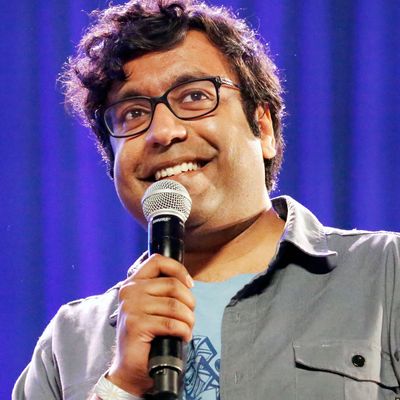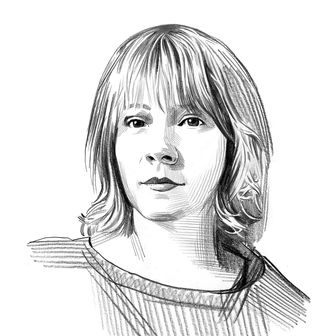
Hari Kondabolu first aired his beef with Simpsons character/stereotypical caricature Apu Nahasapeemapetilon on Totally Biased with W. Kamau Bell. Kondabolu called Apu’s voice “a white guy doing an impression of a white guy making fun of my father.” Apu has always been personal for Kondabolu: an insult to his immigrant parents, a lazy joke for his bullies to appropriate, and a lens through which his comedy is judged. In his new truTV documentary, The Problem with Apu, Kondabolu reaches out to Hank Azaria to explain himself—as well as dozens of South Asian entertainers to talk about why representation matters, their families, and why a borderline minstrel act from the late ‘80s is still on TV.
I’m gonna ask you a question I’m sure you’ve been asked by a billion people already. What’s bell hooks really like?
I did not expect Splitsider to ask me that! That is the best thing in the whole wide world. When bell asked me to do an event with her in Wisconsin, it was the biggest deal in the world to me. I found myself in a green room, telling people, and none of the comics knew what I was talking about. They knew I was happy, but nobody knew what I was referencing. It killed me on the inside. And I realized that there are certain achievements I’ve had that are not achievements to other comics.
She is wonderful, extremely funny. Very blunt, as you would expect. A really warm person, I’m very privileged to call her a friend. It’s surreal to get a phone call from her, and you see “bell hooks” in lowercase letters on your phone. It’s the most amazing feeling.
In the doc, you describe having a love-hate relationship with The Simpsons, as opposed to Kal Penn who has a plain hate-hate relationship with it. How do you navigate loving this thing that is at times very offensive and problematic?
You mean like America?
Yes, I’m asking for advice.
I feel like you can love something and criticize it, right? My mother is like that, particularly with me. She loves me, but I know she wants me to be the best I can be. I think that’s true with The Simpsons. I love that show; it’s a brilliant show. It taught me that smart and funny can be the same thing. They’re never heavy-handed and mean. They’re clever when they make those criticisms. It taught me how to do that. I’m so grateful for that. But then, Apu is very un-Simpsons-like. He’s not a particularly well-thought out character. And to be fair, I don’t think they thought The Simpsons would be around for 30 years when they created these characters. I criticize The Simpsons because I love it. I want it to be better. It’s weird to love something but to have it hurt you in this way. It’s weird that I was embarrassed by the way my parents spoke because of it. I knew I was going to be teased because of it. I knew that it was going to be harder to create things and be an entertainer because expectations were often based on it. And yet, I still love the show. It gave me more than I took away.
What would be the best outcome for Apu? Would you want the character to be completely retired, voiced by an Indian actor, or have him drop the accent?
I think all those things are difficult. I think the best solution in my mind is for the character to have some sort of upward mobility. Let him own Kwik-E-Mart and not have to work there anymore. Let him go into computer science or another field. Develop his kids’ characters. Who are they? Because that’s me. His children, that would be me and my friends and our generation. Have them actually exist in that world in some way.
The Simpsons is funny in that it’s static in some ways, but characters have died, characters have gotten married, characters have come out. They actually have made big changes within the show. For me, I don’t know if killing off the character is the best answer. In a lot of ways, it feels like the lazy answer. I want to see them come up with something creative with that character and actually develop his children.
The upward mobility thing is interesting to me, because there’s an inherent classism as well as racism to Apu. He’s in a servile position. The only South Asian character, his whole job is to smile nicely at white people and never express his frustrations.
Think about [season 5, episode 15, “Homer and Apu”]. He loses his job at the Kwik-E-Mart, and his thought isn’t what’s next. It’s “I am made to serve white people in this community, in a Kwik-E-Mart. This is my life.” How bizarre is that – this view you have to have of immigrants? Well, this is what they are. Why else would he behave that way?
A lot of those early roles [for South Asian actors] were of cab drivers, gas station attendants, and convenience store owners. And I don’t think there’s anything wrong inherently with being in those jobs, because there were a lot of South Asians who had those jobs. I just wish I got to hear their voices. I just wish I got to hear their stories, because there are interesting stories of people who had those jobs in the ‘80s and ‘90s. I want to know what their lives were like. That’s why it was important to me to have my parents in the film. I wanted the voice of immigrants, especially of that generation, to be heard. Because they’re never heard, and they’re spoken for constantly.
Hank Azaria was kind of your white whale, for lack of a better term, throughout the film. How accountable do you think he is for the character, as opposed to the writers?
The producers have stated that he came up with [Apu’s voice] himself. The character was not supposed to have an Indian accent, and he did it, and they kept it. So I think there’s accountability in creating the character. There’s accountability in knowing that people are upset by it and still doing it. It’s tricky because The Simpsons is an institution, and he’s not a writer. He does the writers’ bidding. But even if he’s doing the voice at the behest of this show, he’s still doing it outside of the show. He did it at a graduation ceremony at Tufts. I know he’s aware of it, and I know he saw my piece on Totally Biased, and that it affected him. It made him feel bad and question doing it, but he’s still doing it. So I think the culpability is spread around: producers, writers, Hank. It’s also where society was. We are all responsible because we said it was okay. We allowed it.
You speak with Whoopi Goldberg about her attitude towards minstrelsy, and her negrobilia collection. She’s so oddly chill about it. Do you hope to have that more detached attitude or do you think it’s important to stay critical and stay angry?
I actually see more of the similarities. She kept that collection not for her own amusement. That wasn’t done for enjoyment; that was done to educate. This film is my version of Whoopi’s negrobilia collection. This is my way of not letting people forget that there is a history when it comes to minstrelsy. When it comes to even something we love like The Simpsons, racism is insidious and it kind of seeps into the system, and it doesn’t disappear. We don’t even see it sometimes. Whoopi’s collection, you see it when you enter her home. And I wanted the documentary to force people to see it, and to question.
What do you think can be done, in terms of diversity in the writers’ room, or more accountability for the writers? Even in shows where there are characters of color, the writers’ rooms are frequently overwhelmingly white.
I heard a story about Samantha Bee, and I’m not sure it’s true, but it’s a wonderful story so I hope it’s true. [Note: It’s true.] Someone asked her “Writers’ rooms are so often white and male-dominated, how come yours isn’t?” Her room is half minorities and half women. The tip that she gave was, “Well, you have to hire them.” And I really think it’s as simple as that. There are so many people of color and women, so many voices that don’t get heard.
I think Chris Rock, in his Marc Maron interview, talked about being on Saturday Night Live and having mostly white writers. They would write bits for him, but it was almost like they only knew the best-of black culture. They knew the stereotypes, these big images, but they didn’t have any of the subtlety. They didn’t have any deeper understanding that comes when you have a more diverse room.
Racism is hacky. It’s been done to death. It’s been done before. If you don’t even want to think of it in terms of justice or fairness, just look at it in terms of creativity: you make better things when you have new ideas around you. That’s it. And I think when you experience many different perspectives, you have a lot more to write about. So I think you need to hire people of color, you need to hire women. It leads to better work. And it’s not even a quest. We’re around!
The Problem with Apu airs on truTV this Sunday at 10:00pm.
Photo by David Scott Holloway/Turner.


